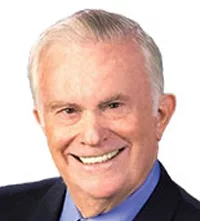When Congress passed and President Donald Trump signed a $2 trillion aid package, historians were astounded that such an unbelievable addition to an already $20 trillion debt would be acceptable to all Americans without a murmur.
But even more incredible was the immediate acclamation by both political parties and the president that more was in store. This was emphasized by House Speaker Nancy Pelosi, who indicated Democrats were preparing another major debt package.
At the same time, both U.S. Treasury Secretary Steven Mnuchin and former White House Domestic Policy Council Director Joe Grogan urged the president to ease social distancing measures put in place because of COVID-19, which have had a catastrophic effect on the economy.
Other leaders noted that global markets wanted to know an end was in sight to this incomparable measure, even if distant. This might ease the grave recessionary downward plunge, sure to grow much worse.
There is no indication that a grave disaster such as in America’s most-populated city, New York City, can be stopped, much less reversed in a short period. But optimists believe other parts of the country may be ready to normalize sooner rather than later.
Some sort of target must be agreed upon, say leading spokesmen of both parties. Otherwise, as the November election nears, the United States could find itself in an “era of negativism” never before faced by this country in its 244-year history.
Skeptics say the harm could be much more significant if attention is diverted from the primary task of defeating the dreaded novel coronavirus disease. Dr. Anthony Fauci, the country’s senior infectious disease specialist, negated the question by stating that a timetable would “have to be flexible.”
Even reliable Trump allies fear the worst if President Trump gets out ahead of the scientific brains on this task force. Some senators used the president’s war-time metaphor of “wanting to bring troops home from Afghanistan as quickly as possible.” He then added that he would heed the warnings of generals, who said the withdrawal could increase instability, bloodshed and the risk of increased terrorism.
Concerned senators further indicated that any decision to open up the economy again should be based on the progress made to “destroy the virus.” Even congressional leaders caution that optimistic desire for an overall solution of economic hardship must first be preceded by the end of the worst disease the world as a whole has ever known.
U.S. Small Businesses Shortchanged
In the aftermath of the horrendous impact of the COVID-19 virus on U.S. economic strength, the American main governmental concern has been in maintaining the stability of large corporations that comprise the backbone of America’s world-leading economy.
Tragically, much of President Donald Trump’s attempt to restart manufacturing and reduce unemployment has almost disappeared as the coronavirus has done its wrecking job emphatically.
Justifiably, the immediate main concern has been with the “disassembling” of major industries such as airlines, automobiles, construction, retail and machinery. These have suffered tremendous downturns as the subsequent unemployment numbers have destroyed the most recent growth of such enterprises of economic strength.
But ignored, initially, were the independent businesses, the foundation of America’s 20th-century economic growth. Attempts to save many fragile small businesses, which were voted on by the U.S. Congress recently, could be too late. These measures may have been insufficient for the tens of thousands of companies that evolved from America’s unique business establishments so successfully.
It should be remembered that the early 20th century utilized the talent of America’s individual business capabilities to flourish into the most successful growth economy in the history of the world. This came about as independent companies often evolved into large corporations.
While government funds alone could not save the many thousands of independents, the lack of focus by public opinion of this urgency may have reversed their very being during the ongoing crisis.
No one will question that these independent businesses have been vital to America’s growth. But the U.S. presidency, Congress, banking units and public attention has practically ignored the foundation of America’s economic greatness — especially public opinion, which has particular strength in this significant election year.
It has almost exclusively pleaded for the economic giants that have become the ultimate backbone of America’s financial world leadership, and what makes this nation tick, particularly in production, distribution, retail support, and significant public interest and support. But most of all, by providing for those persecuted by other nations as a permanent refuge throughout the 20th and 21st centuries.
Such humanism has given America the strength in crushing Nazism and Japanese imperialism in World War II, as well as defeating Germany in the first World War — and rebuilding Europe in both.






